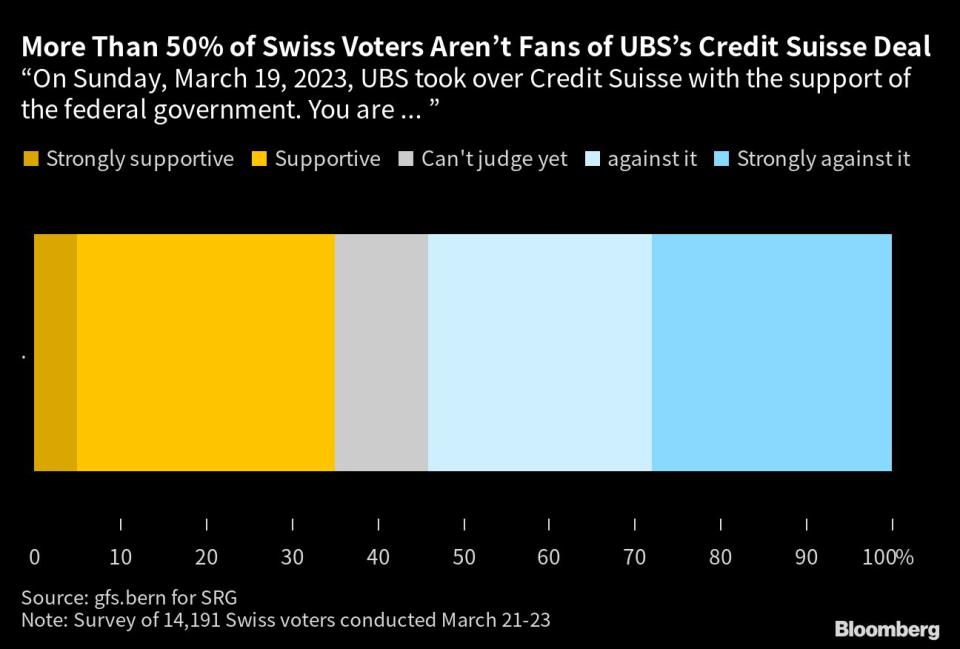Swiss Government Set for Grilling Over UBS-Credit Suisse Deal
(Bloomberg) -- Less than a month after forcing through the creation of a Swiss banking juggernaut, the country’s government is set to be grilled in parliament this week.
Most Read from Bloomberg
Katie Cotton, Guardian of the Apple Brand for 18 Years, Dies
Tumbling Money Supply Alarms Economists Who Foresaw Inflation
Inflation Data Will Shatter the Stock Market Calm, Goldman Partner Warns
Lawmakers gather on Tuesday for a special session after ministers led by President Alain Berset agreed to provide up to 109 billion francs ($120 billion) in taxpayer money to support the takeover of Credit Suisse Group AG by UBS Group AG.
While parliament can do little to derail the deal, lawmakers are still likely to try to push the government to overhaul too-big-to-fail rules and pursue legal action against management at Credit Suisse. It’s unclear at this point which executives might be targeted.
Given the merger has been met with little public enthusiasm and it’s an election year, there’s likely to be plenty of political grandstanding on display.
Here’s what you need to know:
Why is parliament meeting?
The government pushed through the takeover by emergency law, so parliament — just like shareholders — didn’t get a say. Yet the deal included pledges of public funds, allowing lawmakers to call a special session.
The debate is likely more about saving face politically than actually changing things, but MPs do have the opportunity to give the government a hard time.
It’s fairly rare that the Swiss parliament — which typically meets just 12 weeks each year — schedules a special gathering unconnected to its regular timetable, notable cases include those on Covid measures and on the bankruptcy of national carrier Swissair in 2001.
Why won’t parliament be able to stop the deal?
During the weekend the takeover was negotiated, the government had a small group of senior MPs — the so-called financial delegation — sign off on the deal. That six-member body can agree to urgent fiscal matters on behalf of parliament.
The administration has said that lawmakers can’t reverse the decision of the delegation: “If parliament refuses subsequent approval, it will be tantamount to a political reprimand for the financial delegation, with no legal effect.”
What else is on the table?
Given that the bank bailout isn’t popular among the Swiss public, lawmakers want to restrict the government’s leeway in executing the deal. They will try to do so by inserting provisions into amendments to the budget, which are needed to account for the potential public spending on the banks.
Proposed conditions include that the government shouldn’t freely be able to extend state guarantees above the agreed 109 billion francs, and should exhaust all legal options against responsible managers at Credit Suisse.
MPs are also demanding an overhaul of Switzerland’s too-big-to-fail regulation for systemically relevant banks, given that existing framework didn’t prevent the crisis. The second-biggest party in parliament, the center-left Social Democrats, have said they will only approve the state aid if the government publicly commits to new rules which would prevent a case like Credit Suisse in the future.
What is going to happen when?
The session is scheduled for three days from Tuesday through Thursday, but Tuesday will be the main day of debate.
Upper house: 11:15 a.m. to 3 p.m. local time
Lower house: 5:15 p.m. — no ending time specified
Both debates start with a government address to which MPs will then respond. The discussion of the proposed amendments to the budget bill will take place subsequently.
How will the crisis influence the October elections?
As a reminder: Switzerland’s executive isn’t made up of a coalition or an outright majority, but of seven ministers from the country’s four largest parties. They usually make decisions by consensus and try to find pragmatic compromises — often outside of party lines.
Ministers don’t publicly oppose government decisions, irrespective of their parties’ stance on a matter or how they personally voted behind closed doors.
This setup means that parliament offers parties the most high-profile platform to sway voters.
According to polls, Berset’s Social Democrats are considered more credible than any of the other parties related to the crisis, which helps explains their aggressive stance in parliament. By contrast, voters are the least impressed with the pro-business liberals of Finance Minister Karin Keller-Sutter.
--With assistance from Dale Crofts.
Most Read from Bloomberg Businessweek
A Runner’s Murder in Kenya Opens a Window Into Violence Against Women
What to Do With Your Money—and Your Life—in a Wild New World
Scaramucci’s SkyBridge Capital Was Spiraling, and Then Came FTX
©2023 Bloomberg L.P.






